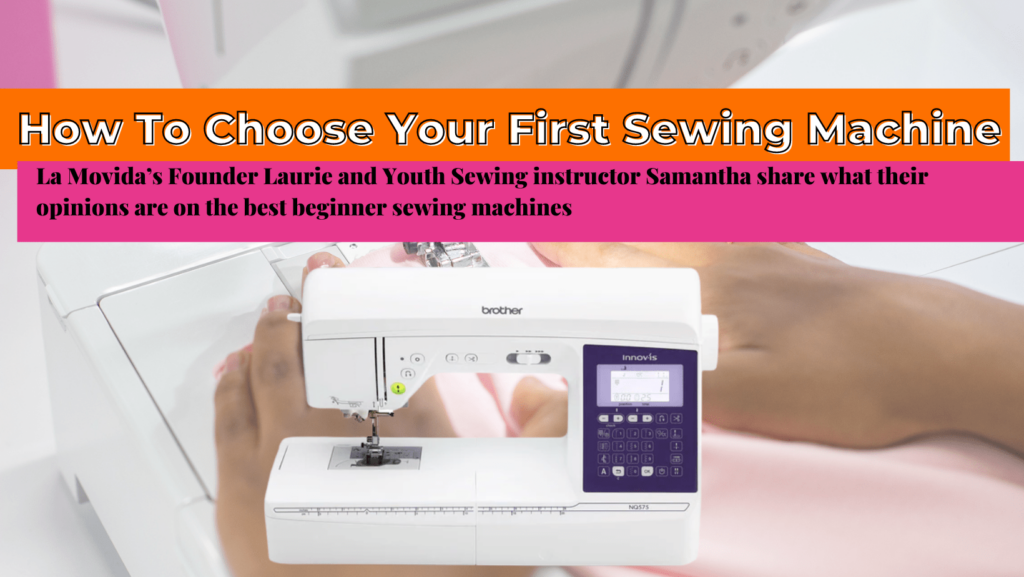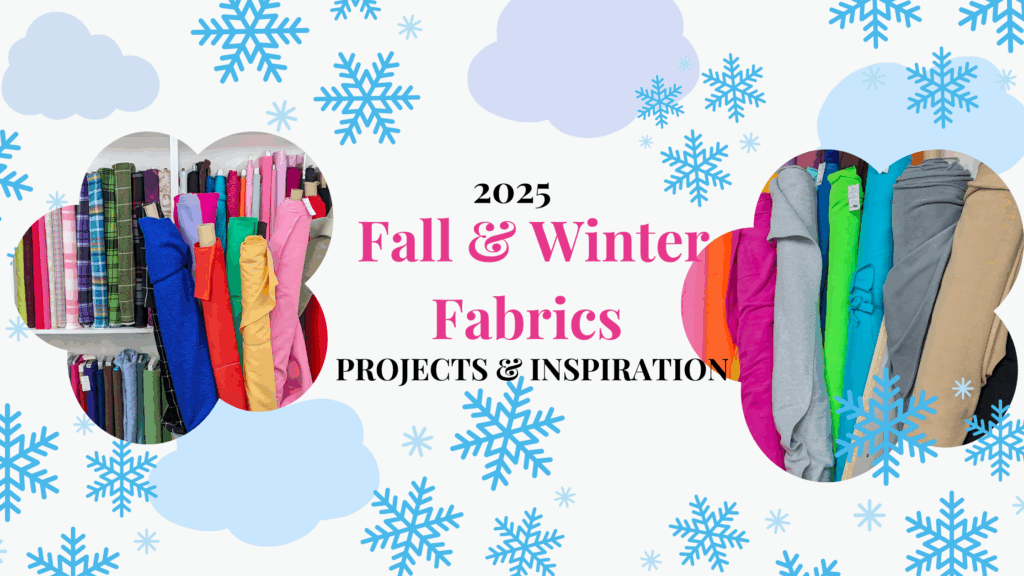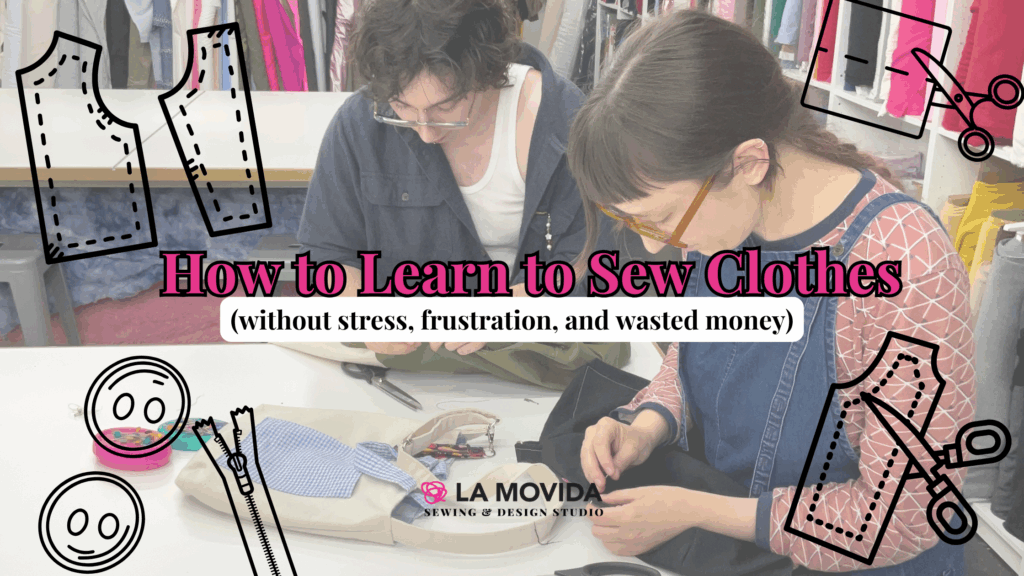La Movida’s Founder Laurie and Youth Sewing instructor Samantha share what their opinions are on what sewing machine to have as a beginner sewer.
Buying your first sewing machine could be the best idea you ever had! Sewing is a helpful skill to have, it’s a great creative outlet that gives a sense of pride and accomplishment. The only thing that could make this experience less than awesome is trying to sew on the wrong machine.
We get the sewing machine question all the time, especially around the holiday season and we are so happy to see sewers excited to start their journey.
What sewing machines do you recommend? How do I choose my first sewing machine?
Laurie and I have collaborated and came up with a list of things to think about when choosing a beginner sewing machine. We have read a few blogs on sewing machine recommendations and we feel there is a bit of information missing as we get to teach sewers in all stages of their journey. We also have our own personal experiences from when we first started sewing.
Both of us started out sewing on old family sewing machines that were in the house, but since then we have tried so many. With Laurie’s experience owning her own fashion label and teaching sewing for the past 9 years and my experience as an alterations seamstress, we’ve got you covered on the Do’s and Don’ts for buying a sewing machine.
We do want to stress that this is mostly about what is suitable for BEGINNERS, not which machine is good in general. As you get more advanced, especially if you’re sewing a lot on this machine, you may want to consider a more heavy duty machine. Keep in mind that these can be a bit stressful to start on.
When should I buy a sewing machine?
Sewing machines are a wonderful investment but are tools not toys. So especially when considering buying a machine for your child you wanna be sure that they are comfortable and capable of taking care of it properly to maximize its utility.
No matter how many classes you’ve taken sewing on your own is different than sewing alone because there is no one there to help diagnose little sewing problems.
We always recommend lessons for kids before getting a machine as there are lots of challenges with both sewing machines and garment construction that are resolved immensely by having experienced assistance while learning. We’ve found that kids can start managing a machine around 8 years old but supervision is mandatory as there is a lot that can go wrong.
We get stories all the time from youth beginner sewing students who have difficulty figuring out how to resolve problems with their home sewing machine due to lack of experience and confidence. Sometimes it’s best to wait on the investment and encourage them to practice with knowledgeable instructors behind them.
How much should your first sewing machine cost?
We discourage new sewers from buying cheap, entry level machines geared to new sewers and children. Sewing machines under $300 are considered ‘disposable” as they are made from mostly plastic parts that are prone to breaking and impossible to repair. In general they can cause the whole sewing experience to be clunky, from a funky ill designed threading mechanism to their tiny motors being noisy from struggling to work.
You want a machine that will be repairable, simple to understand, easy to control, and is consistent in quality.
So when starting your search, look at midrange sewing machines priced between $300 – $700. Sewing machines in this price range have good resale value, need little maintenance and minimal repair. Popular brands have a lot of add-ons at reasonable prices (bobbin case replacements, specialty needles, presser feet, etc.)
*If you’re looking for a more cost efficient option, look into buying second hand. You can find machines at your local thrift store and on Facebook marketplace. We are also very lucky to have second hand textile centres like Our Social Fabric where they take in donated machines and make sure they get serviced.
It’s important that you get a chance to test out your machine before buying to ensure there are no mechanical problems and that you know how to properly thread and know how to operate it.
What features do we look for in sewing machines?
- Drop in bobbin: Drop in bobbins are easier to understand as a beginner and have less possible problems since threading them is fairly straight forward.
- Auto threader : Auto threaders make sewing more accessible as you don’t have to worry about shoving your thread through the eye of the needle.
- Internal cutting mechanism : A lot of modern sewing machines have a cut button on them to snip the thread once you finish sewing so that you don’t need scissors at your sewing machine.
- Button hole stitch : There are a lot of stitches that come pre-programmed on machines, but the essentials are the straight stitch, zig zag, and button hole!
- Speed control : When first learning it’s crucial that you’re able to control the machine. Being able to put a speed limit on your machine can help prevent wonky stitches and big mistakes.
- Presser foot warning : Our machines will not let you sew if your presser foot is up. This is helpful to prevent accidental injury or sewing mistakes by bumping the gas pedal.
- Bigger sewing deck : this is helpful because you’re able to place your fabric on more surface area and have space for your hands to control the material.
What brands are the best?
Depending on who you talk to in the sewing community there are a lot of opinions around this. Our general stance at the studio is that we don’t have specific brand loyalty. We recommend paying attention to reviews and checking what people say about maintenance and repairs. Warranties only cover mechanical or computer problems, not any problems caused by misuse. You want to be sure you know the basics of the machine before walking out with it to avoid any mishaps.
In my experience as an alterations seamstress / tailor I have worked on pretty much every familiar brand; Singer, Janome, Brother, Babylok, Phaff, Bernera, Elna, Kenmore, etc. All varying in age. My personal opinion from this is:
- Singer : Older Singers really rock if you have someone who can properly service them. All older machines are made with mostly metal parts which means they have a lot longer life span and can handle more heavy duty sewing.
- Janome: Janome machines really have been a hit or miss. Some of the ones I have worked on have been fairly standard and reliable, but others have been a bit fussy and prone to breaking.
- Brother: I have had my brother SE400 sewing machine since I was 14 and it’s traveled with me all over North America. My mom did a lot of research before purchasing and found it had the best reviews. We also teach on Brother sewing machines in our sewing studio. I have found them to be reliable, easy to clean and maintain. They come with all the features I need and retain their value.
- Babylok: All the Babylok’s I’ve worked on have been kind of smaller in size, but I haven’t had any major issues with them.
- Phaff: I’ve only worked on Phaff industrial sewing machines before, but I love those. Industrial machines are not really beginner friendly unless you are learning to sew specifically for garment manufacturing, costume sewing, or fashion design. I wouldn’t recommend industrial machines for kids at all because they lack safety features that domestic machines have.
- Bernina & Elna : I’m clumping these two together as I feel similarly about them both. Most of the time when I’ve seen and used these they have been the higher end models so I can’t speak for them as beginner machines.
- Kenmore: An honorable mention as the Kenmore I’ve used was from the 70’s and worked great. I love an old machine, but they also lack safety features that I feel are important for beginners.
What machines do we use in our studio?
The Brother Trendsetter 2 has been our go to for years as it has all the features we look for!
They have tons of beginner friendly features and are easy to maintain.
We are a retailer for these machines and we sell them used as well.
There is also a more cost efficient option that we carry. It does have a smaller sewing deck, less stitches, and doesn’t have an internal cutting mechanism.
- Brother Design Star Sewing Machine NS80E$529.00Add to cart
- Brother Trendsetter 2 Sewing Machine NQ575$1099.00Add to cart
- Brother Trendsetter 2 Sewing Machine NQ575 | USED$750.00Add to cart
Overall when looking for a sewing machine you are looking for something that is in the $300 – $700 price range for a beginner, has all the features you need, and is accessible to repair and maintain. Getting the right sewing machine is a great investment into a life long skill.
As always if you have any further questions or want our professional opinion on the machines that you are looking at you can email us or send us a message on social media.






